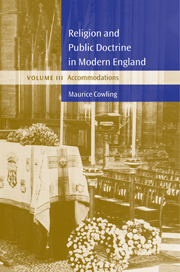Book contents
- Frontmatter
- Contents
- Foreword and acknowledgements
- Introduction
- I The Christian intellect and modern thought in modern England
- II The post-Christian consensus
- 15 Modern knowledge and the post-Christian consensus I
- 16 Modern knowledge and the post-Christian consensus II
- 17 Modern knowledge and the post-Christian consensus III
- 18 Modern knowledge and the post-Christian consensus IV
- 19 English Socialism as English religion
- 20 Literature and the post-Christian consensus
- 21 Modern knowledge and the post-Christian consensus V
- 22 Modern knowledge and the post-Christian consensus VI
- 23 Judaism and the post-Christian consensus
- III Conclusion: religion and public doctrine in modern England
- Notes
- Index of proper names
21 - Modern knowledge and the post-Christian consensus V
Published online by Cambridge University Press: 23 December 2009
- Frontmatter
- Contents
- Foreword and acknowledgements
- Introduction
- I The Christian intellect and modern thought in modern England
- II The post-Christian consensus
- 15 Modern knowledge and the post-Christian consensus I
- 16 Modern knowledge and the post-Christian consensus II
- 17 Modern knowledge and the post-Christian consensus III
- 18 Modern knowledge and the post-Christian consensus IV
- 19 English Socialism as English religion
- 20 Literature and the post-Christian consensus
- 21 Modern knowledge and the post-Christian consensus V
- 22 Modern knowledge and the post-Christian consensus VI
- 23 Judaism and the post-Christian consensus
- III Conclusion: religion and public doctrine in modern England
- Notes
- Index of proper names
Summary
The potentialities of human experience in any age are realized only by a tiny minority, and the important poet is important because he belongs to this (and has also, of course, the power of communication) … If the poetry and intelligence of the age lose touch with each other, poetry will cease to matter much, and the age will be lacking in fine awareness.
(F. R. Leavis, New Bearings in English Poetry, 1932, 1972 edn, pp. 16–17)Consider … the isolation of the human situation, the facts of birth, and of death, … man's place in the perspective of time and the enormity of his ignorance, not … as targets for doctrine, but as … objects for meditation … then in the glow of their emotional reverberation, pass the poem through the mind, silently reciting it as slowly as it allows. Whether what it can stir in us is important or not to us, will, perhaps, show itself then. Many religious exercises and some of the practices of divination and magic may be thought to be directed in part towards a similar quest for sanction, to be rituals designed to provide standards of sincerity … It might be said, indeed, with some justice, that the value of poetry lies in the difficult exercise in sincerity it can impose upon its readers even more than upon the poet.
(I. A. Richards, Practical Criticism, 1929, pp. 290–1)Where else in prose … [except in] … the incomparable end of Part Two of The Pilgrim's Progress … can a like sustained exaltation be found? … It is something, clearly, that could not be reproduced today. […]
- Type
- Chapter
- Information
- Religion and Public Doctrine in Modern England , pp. 571 - 593Publisher: Cambridge University PressPrint publication year: 2001



